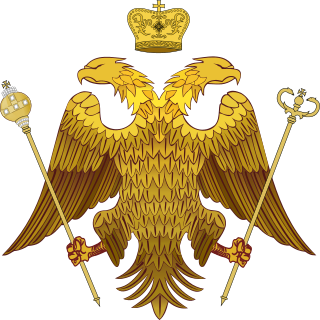
The Cyprus dispute, also known as the Cyprus conflict, Cyprus issue, or Cyprus problem, is an ongoing dispute between Greek Cypriots and Turkish Cypriots in the aftermath of the 1974 Turkish military invasion and occupation of the northern third of Cyprus. Although the Republic of Cyprus is recognized as the sole legitimate state – sovereign over all the island – the north is under the de facto administration of the self-declared Turkish Republic of Northern Cyprus, which is guarded by Turkish Armed Forces. Only Turkey recognizes the Turkish Republic of Northern Cyprus, while there is broad recognition that the ongoing military presence constitutes occupation of territories that belong to the Republic of Cyprus. According to the European Court of Human Rights, the Turkish Republic of Northern Cyprus should be considered a puppet state under effective Turkish control.

The Church of Cyprus is one of the autocephalous Greek Orthodox Churches that together with other Eastern Orthodox Churches form the communion of the Eastern Orthodox Church. It is one of the oldest Eastern Orthodox autocephalous churches, achieving independence from the Patriarchate of Antioch and All the East in 431. The bishop of the ancient capital, Salamis was constituted metropolitan by Emperor Zeno, with the title archbishop.

The Progressive Party of Working People is a Marxist–Leninist, communist political party in Cyprus.

Makarios III was a Greek Cypriot clergyman and politician, who served as the Archbishop and Primate of the autocephalous Church of Cyprus (1950–1977) and as the first President of Cyprus (1960–1977). In his three terms as president he survived four assassination attempts and a coup d'état. He is widely regarded by Greek Cypriots as the Father of the Nation or "Ethnarch".

The Movement for Social Democracy is a Greek Cypriot nationalist, social-democratic political party in Cyprus.

EOKA, acronym for Ethniki Organosis Kyprion Agoniston, was a Greek Cypriot nationalist guerrilla organisation that fought a campaign for the end of British rule in Cyprus, for the island's self-determination and for eventual union with Greece.

A referendum on the Annan Plan was held in the Republic of Cyprus and the breakaway Turkish Republic of Northern Cyprus on 24 April 2004. The two communities were asked whether they approved of the fifth revision of the United Nations proposal for reuniting the island, which had been divided since 1974. While it was approved by 65% of Turkish Cypriots, it was rejected by 76% of Greek Cypriots. Turnout for the referendum was high at 89% among Greek Cypriots and 87% among Turkish Cypriots, which was taken as indicative of great interest in the issue on the part of the electorates.

Georgios Grivas, also known by his nom de guerreDigenis (Διγενής), which he adopted while in EOKA, was a Cyprus-born general in the Greek Army, leader of the EOKA guerrilla organisation.
Greek Cypriots are the ethnic Greek population of Cyprus, forming the island's largest ethnolinguistic community. According to the 2011 census, 659,115 citizens in Cyprus recorded their ethnicity as Greek Cypriot, forming 78% of the population in the internationally recognised territories.

Elections in Cyprus gives information on election and election results in Cyprus.

This article is about the history of Cyprus from 1878 to the present.
Taksim was the objective of Turkish Cypriots who supported a partition of the island of Cyprus into Turkish and Greek portions, a concept declared as early as 1957 by Dr. Fazıl Küçük.

The Turkish invasion of Cyprus, code-named by Turkey as Operation Attila, was a Turkish military invasion of the island country of Cyprus. It was launched on 20 July 1974, following the Cypriot coup d'état on 15 July 1974.
The Turkish Cypriot diaspora is a term used to refer to the Turkish Cypriot community living outside the island of Cyprus.

Enosis Neon Paralimni Football Club is a Cypriot football team from Paralimni. Currently playing in the first division, it holds home games at the Paralimni Municipal Stadium "Tasos Marcou", which holds 5,800 people.
Several distinct periods of Cypriot intercommunal violence involving the two main ethnic communities, Greek Cypriots and Turkish Cypriots, marked mid-20th century Cyprus. These included the Cyprus Emergency of 1955–59 during British rule, the post-independence Cyprus crisis of 1963–64, and the Cyprus crisis of 1967. Hostilities culminated in the 1974 de facto division of the island along the Green Line following the Turkish invasion of Cyprus. The region has been relatively peaceful since then, but the Cyprus dispute has continued, with various attempts to solve it diplomatically having been generally unsuccessful.

British Cyprus was the island of Cyprus under the dominion of the British Empire, administered sequentially from 1878 to 1914 as a British protectorate, a unilaterally annexed military occupation from 1914 to 1922 and from 1922 to 1960 as a Crown colony.
Greek-Cypriot nationalism is an ethnic nationalism emphasising Greekness of the Cypriot nation, whilst contrasting with Greek nationalism which aspires to integrate Cyprus into Greece as its main and number one objective. Having abandoned the idea of enosis, Greek Cypriot nationalists now have the aim of a Greek Cypriot-controlled state with close relations to Greece, the "motherland". Variants of the nationalism have been espoused by the centre-right Democratic Party (DIKO), the right-wing New Horizons, Socialists (EDEK), the Greek Orthodox Church of Cyprus, and nationalist elements within the centre-right Democratic Rally (DISY).













